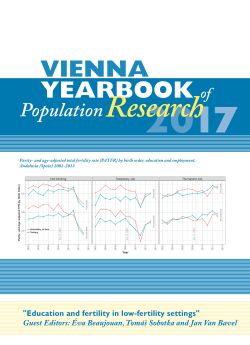
Vienna Yearbook of Population Research 2017, pp. , 2018/06/18
Special issue on Education and fertility in low-fertility settings

The existing research on education and fertility has been enriched by studies that take into account educational field in addition to educational level. The present paper adds western Germany, which has exceptionally high levels of childlessness, to the list of cases for which comparable research has been conducted. The association between educational attainment, childlessness, and ultimate fertility among women born between 1955 and 1959 is examined using data from the 2008 German Microcensus. Despite the strong association with the level of education, childlessness also varies by educational field in western Germany. Consistent with findings from other countries, the results show that women educated in teaching and health care have the lowest rates of childlessness at each educational level, while women educated in administration, economics or social sciences have the highest levels of childlessness. Educational field and level account equally for variation in ultimate fertility.
Keywords: Fertility; Women; Education; Demography; Gender; Equality; Germany